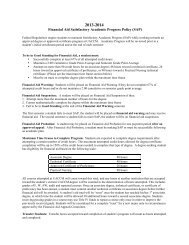college information To complete graduation requirements for your ...
college information To complete graduation requirements for your ...
college information To complete graduation requirements for your ...
Create successful ePaper yourself
Turn your PDF publications into a flip-book with our unique Google optimized e-Paper software.
NUR 2204 Medical Surgical Nursing II. ...............................................................4 Cr. (4 Lec.)<br />
Prerequisite: Successful completion of second semester practical nursing <strong>requirements</strong>. This course prepares students <strong>for</strong> continuation of NUR 1204<br />
Medical Surgical Nursing I. During this course, anatomy, physiology and pathophysiology of the following body systems and their disorders<br />
will be discussed: cardiovascular, peripheral vascular, nervous, endocrine, sensory, hematology/lymphatic, and male/female reproductive.<br />
The course also addresses sexually transmitted diseases, emergency/disaster preparation, and genetic research/cloning. Students will utilize<br />
critical thinking and the nursing process to explore disorders and to provide holistic nursing care across the wellness/illness continuum. The<br />
Nurse Practice Act will be introduced to prepare students <strong>for</strong> professional, ethical, and legal issues encountered in nursing practice.<br />
NUR 2206L Clinical Practicum III .................................................................... 6 Cr. (18 Lab)<br />
Prerequisite: Successful completion of second semester practical nursing <strong>requirements</strong>. This course provides the opportunity <strong>for</strong> continued clinical<br />
application of nursing theory and skills in a variety of community health care settings. It provides students with experiences to become more<br />
independent in their practice of nursing. The pediatric clinical rotation and leadership rotation are <strong>complete</strong>d in this course.<br />
123.e<br />
course descriptions<br />
Nursing—Registered Nursing<br />
NSG 1213 Math <strong>for</strong> Nurses ...........................................................................3 Cr. (3 Lec.)<br />
Prerequisite: ACT Math Score of 16, COMPASS Pre-Algebra score of 34, COMPASS Algebra score of 21, or grade of “C” or higher in MATH 1233 Math<br />
<strong>for</strong> Technical Programs AND Admission to the Practical Nursing Program or currently a licensed practical nurse in pursuit of an AAS-RN. This course<br />
provides instruction in dosage calculation using ratio to proportion and other means of calculation related to medication. <strong>To</strong>pics include<br />
interpretation of drug labels, syringe types, conversions, roman numerals, reconstitution and apothecaries, mixing medications, IV flow rates,<br />
drip rates, interpretation of physician orders and transcribing to medication administration records, dispensing, and proper documentation of<br />
medications as well as the six rights of medical administration and military time.<br />
NSG 2119 Nursing Process I. .........................................................................9 Cr. (9 Lec.)<br />
Prerequisite: Admission to the ARNEC program. Co-requisite: Concurrently enrolled in NSG 2123L Nursing Practicum I. This course provides the<br />
foundational theory <strong>for</strong> LPNs/LPTNs to transition to the responsibilities and roles of RNs. The student is introduced to ARNEC’s goals,<br />
philosophy, and learning objectives. These objectives will build on the concepts of holism, human need, nursing process, communications,<br />
safety, and wellness-illness across the life span. The student’s fundamental knowledge base will evolve by introducing knowledge, assessment<br />
and clinical skills, behaviors, and critical thinking skills that are required to function in the role as a registered nurse. This course also explores<br />
the legal, ethical, and social issues related to the registered nursing role. Basic pharmacology and fundamental nursing theory, skills, and<br />
medical math will be reviewed to prepare students <strong>for</strong> subsequent semesters.<br />
This course also provides lecture content <strong>for</strong> the age group involving the newborn through adolescence (pediatrics). The student will be<br />
provided a longitudinal view of the child as an individual on a continuum of developmental changes and as a member of a family unit. There<br />
will be discussion of social, cultural, and religious influences on child development and health promotion. Students will receive instruction on<br />
pediatric assessment, including interviewing skills, physical and behavioral observations, developmental levels, and preventive health care<br />
guidelines. Instruction will also include care of the child with cognitive and sensory impairment, chronic illness, serious body system diseases,<br />
and pain. Care of the hospitalized child, including pediatric clinical procedures, and home care guidelines are incorporated into the content.<br />
NSG 2123L Nursing Practicum I ...................................................................... 3 Cr. (9 Lab)<br />
Prerequisite: Admission to the ARNEC program. Co-requisite: Concurrently enrolled in NSG 2119 Nursing Process I. This clinical lab course enables<br />
the student to practice the knowledge, skills, and behaviors that are acquired in NSG 2119 Nursing Process I. Students will have the<br />
opportunity to learn new clinical skills along with sharpening previously learned skills. Practicum hours will include general clinical skills,<br />
medication administration, pediatric client care, and medical/surgical client care. Students are introduced to the role of the registered nurse<br />
by applying new skills in the assessment, planning, intervention, and evaluation of their clients. Curriculum concepts and comprehension are<br />
carried out per clinical application.<br />
NSG 2216 Nursing Process II . . . . . . . . . . . . . . . . . . . . . . . . . . . . . . . . . . . . . . . . . . . . . . . . . . . . . . . . . . . . . . . . . . . . . . . . . 6 Cr. (8 Lec.)<br />
Prerequisite: Grade of “C” or better in both NSG 2119 Nursing Process I and in NSG 2123L Nursing Practicum I. Co-requisite: Concurrently enrolled<br />
in NSG 2223L Nursing Practicum II. The first part of this course utilizes an integrated approach to further emphasize the skills, knowledge,<br />
and behaviors needed to care <strong>for</strong> clients in the areas of the child-bearing family, newborn, and women’s health. <strong>To</strong>pics will include normal<br />
and high-risk client care in the areas of the prenatal period, labor and delivery, postpartum, and the newborn period. The emerging field<br />
of genetics, major genetic diseases, and the role nurses play are also incorporated. Lecture content also includes human reproduction,<br />
reproductive health, family planning, female cancers, and general women’s health care. The second part of this course provides principles





